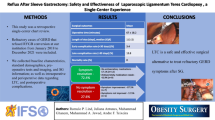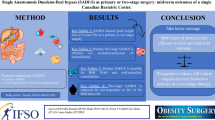Abstract
Background
Recently, laparoscopic sleeve gastrectomy (LSG) as a standalone bariatric procedure has rapidly gained popularity worldwide mainly because of its technical simplicity and the relatively good short-term outcome. In Japan, according to a domestic survey, 71 % of the bariatric procedures performed were LSG. However, the number of studies reporting long-term results are still not enough; particularly, data for Asian patients are scarce.
Objective
The objective of this study was to evaluate the long-term outcomes for LSG in morbidly obese Japanese regarding weight loss and safety.
Methods
Between October 2005 and July 2013, 179 morbidly obese Japanese patients (Female 89/Male 90) underwent LSG as a standalone procedure. The mean age was 40.7 years (range, 20–72 years), and the mean preoperative body weight and body mass index (BMI) were 120.4 kg (range, 71.4–231.6 kg) and 43.3 kg/m2 (range, 30.9–76.5 kg/m2), respectively. All patients were evaluated and managed under a strict multidisciplinary team approach.
Results
The mean BMI declined to 30.0 ± 8.7 kg/m2 at 1 year, 29.1 ± 8.6 kg/m2 at 2 years, 28.8 ± 8.7 kg/m2 at 3 years, 29.3 ± 9.2 kg/m2 at 4 years, and 32.7 ± 13.6 kg/m2 at 5 years or more (p < 0.001). The mean percent total body weight loss (%TWL) achieved was 32.4 ± 12.9 % at 1 year, 34.3 ± 12.9 % at 2 years, 34.4 ± 11.6 % at 3 years, 32.8 ± 10.9 % at 4 years, and 29.5 ± 11.8 % at 5 years or more. Super morbidly obese patients and patients whose gastric tube was created using a thicker (45 Fr.) bougie had a tendency to achieve less weight loss. Early and late complications occurred in 16 patients (8.9 %) and in seven patients (3.9 %), respectively. Revision surgeries were required in six patients (3.4 %). The reasons for revision surgery were insufficient weight loss in five patients and intractable gastroesophageal reflux disease (GERD) in one patient.
Conclusion
LSG for Japanese morbidly obese patients is safe, effective, and acceptably durable up to 5 years although some complications unique to the procedure such as leakage from the staple line and intractable GERD occur. For super morbidly obese patients, other surgical options may be required.





Similar content being viewed by others
References
Presented at the International Federation for the Surgery of Obesity and Metabolic Disorders (IFSO) annual meeting in 2014 (Montreal, Canada).
Tagaya N, Kasama K, Inamine S, et al. Evaluation of the excluded stomach by double-balloon endoscopy after laparoscopic Roux-en-Y gastric bypass. Obes Surg. 2007;17(9):1165–70.
The annual surveys and questionnaires of laparoscopic bariatric surgery and endoscopic intragastric balloon placement 2013. The Japan Consortium of Obesity and Metabolic Surgery (JCOMS).
Brethauer SA, Hammel JP, Schauer PR. Systematic review of sleeve gastrectomy as staging and primary bariatric procedure. Surg Obes Relat Dis. 2009;5(4):469–75.
Diamantis T, Apostolou KG, Alexandrou A, et al. Review of long-term weight loss results after laparoscopic sleeve gastrectomy. Surg Obes Relat Dis. 2014;10(1):177–83.
Zachariah SK, Chang PC, Ooi AS, et al. Laparoscopic sleeve gastrectomy for morbid obesity: 5 years experience from an Asian center of excellence. Obes Surg. 2013;23(7):939–46.
Kasama K, Tagaya N, Kanahira E, et al. Has laparoscopic bariatric surgery been accepted in Japan? The experience of a single surgeon. Obes Surg. 2008;18(11):1473–8.
Guidelines for Clinical Application of Laparoscopic Bariatric Surgery. Society of American Gastrointestinal and Endoscopic Surgeons (SAGES). http://www.sages.org/publications/guidelines/guidelines-for-clinical-application-of-laparoscopic-bariatric-surgery/.
Tagaya N, Kasama K, Kikkawa R, et al. Experience with laparoscopic sleeve gastrectomy for morbid versus super morbid obesity. Obes Surg. 2009;19(10):1371–6.
Teramoto T, Sasaki J, Ueshima H, et al. Treatment—Therapeutic lifestyle modification. J Atheroscler Thromb. 2008;15(3):109–15.
Oshiro T, Kasama K, Umezawa A, et al. Successful management of refractory staple line leakage at the esophagogastric junction after a sleeve gastrectomy using the HANAROSTENT. Obes Surg. 2010;20(4):530–4.
Rosenthal RJ. International sleeve gastrectomy expert panel. International sleeve gastrectomy expert panel consensus statement: Best practice guidelines based on experience of >12,000 cases. Surg Obes Relat Dis. 2012;8(1):8–19.
Lee WJ, Wang W, Chen TC, et al. Clinical significance of central obesity in laparoscopic bariatric surgery. Obes Surg. 2003;13:921–5.
Dietary Guidelines for Americans 2005, U.S. Department of Health and Human Services, U.S. Department of Agriculture, p 29.
Eisenberg D, Bellatorre A, Bellatorre N. Sleeve gastrectomy as a stand-alone bariatric operation for severe, morbid, and super obesity. JSLS. 2013;17(1):63–7.
Al Falah HM, AlSalamah SM, Abdullah M, et al. An experience of laparoscopic sleeve gastrectomy in obese, morbidly obese, and super morbidly obese patients. Saudi Med J. 2013;34(5):503–10.
Alexandrou A, Felekouras E, Giannopoulos A, et al. What is the actual fate of super-morbid-obese patients who undergo laparoscopic sleeve gastrectomy as the first step of a two-stage weight-reduction operative strategy? Obes Surg. 2012;22(10):1623–8.
Lemanu DP, Srinivasa S, Singh PP, et al. Single-stage laparoscopic sleeve gastrectomy: Safety and efficacy in the super-obese. J Surg Res. 2012;177(1):49–54.
Zerrweck C, Sepúlveda EM, Maydón HG, et al. Laparoscopic gastric bypass vs. sleeve gastrectomy in the super obese patient: Early outcomes of an observational study. Obes Surg. 2014;24(5):712–7.
Abdallah E, El Nakeeb A, Yousef T, et al. Impact of the extent of antral resection on surgical outcomes of sleeve gastrectomy for morbid obesity (a prospective randomized study). Obes Surg. 2014;24(10):1587–94.
Parikh M, Issa R, McCrillis A, et al. Surgical strategies that may decrease leakage after laparoscopic sleeve gastrectomy: a systematic review and meta-analysis of 9,991 cases. Ann Surg. 2013;257(2):231–7.
Spivak H, Rubin M, Sadot E, et al. Laparoscopic sleeve gastrectomy using a 42-French versus 32-French bougie: the first-year outcome. Obes Surg. 2014;24(7):1090–3.
Shi X, Karmali S, Sharma AM, et al. A review of laparoscopic sleeve gastrectomy for morbid obesity. Obes Surg. 2010;20(8):1171–7.
Acknowledgments
The authors wish to thank Ms. Sandra Cave who assisted in the proof-reading of this manuscript.
Conflict of Interest
The authors declare that they have no competing interests.
Ethical Approval
All procedures performed in studies involving human participants were in accordance with the ethical standards of the institutional and/or national research committee and with the 1964 Helsinki declaration and its later amendments or comparable ethical standards.
Informed Consent
Informed consent was obtained from all individual participants included in the study.
Author information
Authors and Affiliations
Corresponding author
Rights and permissions
About this article
Cite this article
Seki, Y., Kasama, K. & Hashimoto, K. Long-Term Outcome of Laparoscopic Sleeve Gastrectomy in Morbidly Obese Japanese Patients. OBES SURG 26, 138–145 (2016). https://doi.org/10.1007/s11695-015-1728-1
Published:
Issue Date:
DOI: https://doi.org/10.1007/s11695-015-1728-1




